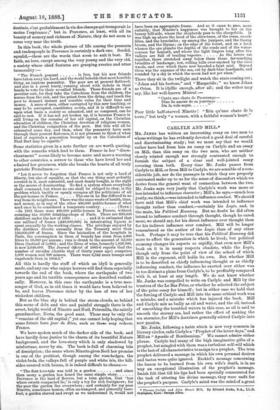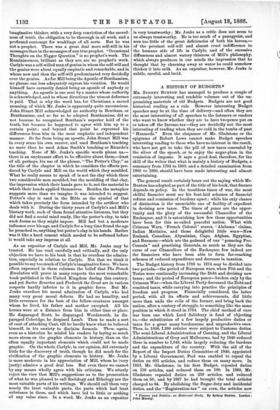CARLYLE AND MILL.*
MB. JENKS has written an interesting essay on two men te whose writings he has evidently devoted a good deal of careful and discriminating study; but we must say that we would rather have had from him an essay on Carlyle and an essay' on Mill, than this essay on the two men, who are neither closely related enough nor strongly contrasted enough to- furnish the subject of a clear and well-jointed essay covering them both. Every time Mr. Jenks passes from Carlyle to Mill, or from Mill to Carlyle, we are sensible of a con- siderable jolt, nor do the passages in which they are properly contrasted make up to us for the sense of discomfort which we derive from the general want of connection between the two. Mr. Jenks says very justly that Carlyle's work was more or leas intended to influence character; Mill's, he says,—much lesa. justly, we think,—was intended to influence conduct. We shotd& have said that Mill's chief work was intended to influence thought rather than conduct,—certainly his Logic, and, in the main, his Political Economy. But no doubt he did often intend to influence conduct through thought, though he cared. more, we should say, for his direct influence over thought than for his indirect influence over conduct. Mill will be longer remembered as the author of the Logic than of any other book. Perhaps it may be true that his Political Economy did more to affect the -generation in which he lived; but political economy changes its aspects so rapidly, that even now Mill's book on it is in many respects obsolete, while the Logic, though only from the point of view of the school of which_ Mill. is the exponent, still holds its own. But whether Mill is to be described as chiefly influencing thought or as chiefly influencing conduct, the influence he exerted over either was- in too distinct a plane from Carlyle's, to be profitably compared with it, at least at any length. We do not know whether Mr. Jenks was compelled to write on Carlyle and Mill by the
of the Le Bas Prize, or whether he selected the subject of the prize essay for himself ; but in either case we hold that the forcing of Carlyle and Mill into the same critical work was a mistake, and a mistake which has injured the book. Mill and Carlyle mix as badly as oil and water, and the oil, insteadi of smoothing the troubled waters in this case, as oil is said to smooth the stormy sea, had rather the effect of making the sea stormier, for Mill's doctrines generally stirred Carlyle into new passion.
Mr. Jenks, following a habit which is now very common in literary circles, calls Carlyle a "Prophet of the latter days," and. /ffill an "Apostle of Benthamism." We cannot admire either phrase. Carlyle had many of the high imaginative gifts of a prophet, but mingled with them was a turbulent self-will which is the last of all characteristics to assign to a prophet. The true prophet delivered a message in which his own personal desires and tastes were quite ignored. Ezekiel's message concerning the lesson to be learned from his own wife's death, is in no way an exceptional illustration of the prophet's message. Isaiah felt that till his lips had been specially consecrated for the task of uttering his divine message, they were unfit for the prophet's purpose. Carlyle's mind, was the mind of a great
• Thomas Carlyle and John Stuart Mitt By Edward Jenks, B.A., LL.B. Orpington, Kent: George Allen. imaginative thinker, with a very deep conviction of the sacred- ness of truth, the obligation to be thorough in all work, and a -profound contempt for weaklings of all sorts. But he was not a prophet. There was a great deal more self-will in his messages than in the messages of any true prophet. "Occasional Thoughts on the Nigger Question" is no prophet's work. The Reminiscences, brilliant as they are, are no prophet's work. Carlyle was a self-willed man of genius in whom the self-will and the genius were about equally emphatic and remarkable, and in 'whom now and then the self-will predominated very decidedly over the genius. As for Mill being the Apostle of Benthamism, no phrase can less adequately express his vocation. He would himself have earnestly denied being an apostle of anybody or anything. An apostle is one sent by a master whose authority is acknowledged, and to whose directions the utmost deference is paid. That is why the word has, for Christians, a sacred meaning, of which Mr. Jenks is apparently quite unconscious. John Stuart Mill acknowledged no authority in Bentham, or Benthamism, and so far as he adopted Benthamism, did so not because he recognised Bentham's superior hold of the truth, but because he happened to agree with him up to a certain point ; and beyond that point he expressed his differences from him in the most emphatic and independent manner. So far from being an apostle, John Stuart Mill was in every sense his own master, and used Bentham's teaching no more than he used Adam Smith's teaching or Ricardo's teaching. None of Mr. Jenks's specific words please us,— -there is an unpleasant effort to be effective about them,—least of all, perhaps, his use of the phrase, "The Potter's Clay," as the title of the chapter in which he considers the effects pro- duced by Carlyle and Mill on the world which they moulded. What he really means to speak of is not the clay which these two considerable men moulded, but the mouldiirg of that clay, the impression which their hands gave to it, not the material to which their hands applied themselves. Besides, the metaphor suggests more than we imagine it was intended to suggest. Potter's clay is used in the Bible as the symbol of that which takes precisely the form intended by the artificer who deals with it. During the thirty years of Carlyle's and Mill's literary work, each of them found attentive listeners, but they did not find a social mind ready, like the potter's clay, to take such forms as they might impose. Mill had but a moderate influence over his age, and Carlyle for a long time found the age le preached to, anything but potter's clay in his hands. Rather was it like a hard cement which needed to be softened before it would take any impress at all.
As an expositor of Carlyle and Mill, Mr. Jenks may be trusted. He has read carefully and critically, and the only objection we have to his book is that he overdoes the admira- tion, especially in relation to Carlyle. Not that we think it possible to say too much of Carlyle's imaginative force. We have often expressed in these columns the belief that The French Revolution will prove in many respects the most remarkable book published in the United Kingdom during this century, and yet Sartor Resartus and Frederick the Great are in various respects hardly inferior to it in graphic force. But Mr. Jenks overdoes his moral admiration of Carlyle, who had many very great moral defects. He had no humility, and little reverence for the best of the fellow-creatures amongst whom he lived, his father and mother excepted. All his heroes were at a distance from him in either time or place. He disparaged Scott, he disparaged Wordsworth, he dis- paraged Coleridge, he despised Lamb. Then he made a sort of cant of attacking Cant, till he hardly knew what he believed himself, in his anxiety to disclaim formula. Then, again, even as a historian he misled his readers by laying so much more stress on the graphic elements in history, than on the often equally important elements which could not be made graphic. On the whole, Carlyle, in our opinion, did extremely little for the discovery of truth, though he did much for the vivification of the graphic elements in history. Mr. Jenks is more moderate in his appreciation of Mill, whom he (very justly) admires a good deal less. But even there we cannot by any means wholly agree with his criticism. We utterly reject the view that Mill's suggestions as to the prosecution of what he was pleased to call Sociology and Ethology are the most valuable parts of his writings. We should call them very nearly the least valuable parts, the parts which had least substance in them, and which have led to little or nothing of any value since. In a word, Mr. Jenks as an expositor is very trustworthy; Mr. Jenks as a critic does not seem to us always trustworthy. He is too much of a panegyrist, and sees too little of the great deficiencies of both his heroes,— of the petulant self-will and almost cruel indifference to the humane side of life in Carlyle, and of the excessive diffuseness and almost watery thinness of Mill's philosophy, which always produces in our minds the impression that he thought that by churning away at water he could somehow thicken it into milk. As an expositor, however, Mr. Jenks is subtle, careful, and lucid.



































 Previous page
Previous page